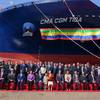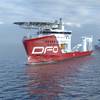Turkey Maritime Sector Alive & Kicking
Located on the periphery of two great continents, Turkey has benefitted from being in a favored position right at the center of an assertive and fast growing economic area. This geographical location finds Turkey in a very favorable position. Despite the general economic recession, the country’s shipping ports and shipbuilding sectors have faced challenges resolutely and expanded consistently.
With a coastline of approximately 8,483 km, (1,067 km of which are island shores) Turkey is situated to the southeast of Europe, south of the former Soviet Union, northwest of the Middle East and northeast of the Mediterranean Sea where the European and Asian continents meet across the Turkish straits.
The distribution of the coastline according to the four seas rimming Turkey is:
- Black Sea 1,719 km (20.3%)
- Sea of Marmara 1,474 km (17.4%)
- Aegean Sea 3,265 km (38.5%)
- Mediterranean 2,025 km (23.9%).
A little more than half of the population (50.8%) lives in coastal areas (i.e. 37,965 million out of 74,724 million). And more than half of this coastal population lives along the Sea of Marmara.
The straits of Bosphorus and Dardanelles and the Sea of Marmara in the northwest of Turkey where the European and Asian continents meet, are known as the Turkish straits. In addition, the Black Sea meets the Aegean Sea through these straits, where Turkey and Greece have coastlines, and it then meets the Mediterranean Sea. Therefore, the Turkish straits play an important role in the geopolitical, geographical and strategic situation of Turkey.
Although the land of these straits belongs to Turkey, the water running through them and connecting the Black Sea and the Aegean Sea is considered as international waters for freedom of navigation according to some authorities. For instance, an annual total of 60 million tonnes of crude oil is carried by vessels through these straits. With 90% of Turkish foreign trade being carried by sea, shipping has been one of the more significant industries with direct impact upon the country’s economy.
The Turkish merchant fleet of 1,000 grt and above consists of 690 ships. Three hundred and twenty three ships (7.8 million DWT) have been acquired by importation and 367 ships (2.2 million DWT) have been built in Turkey (as of January 2013). The average age of these ships is 26.5 years of which that of the container fleet and chemical tankers are 11 years (as of January 2013).
From 1980 the Turkish maritime industry has grown consistently. In fact, the industry maintains its position as one of the locomotive industries of the country. While the size of its shipping fleet has continued to grow the Turkish shipowners being able to gain greater access to funding were able to modernize their fleet significantly.
The Turkish ship owners clearly prefer to flag out using offshore registries for the benefits of low taxation and crew costs. The flagged out vessels operated by Turkish operators are approximately more than half of the national merchant fleet and are mostly under various flags, such as Malta, Panama, Liberia, the Bahamas or St Vincent and the Grenadines. As a result of flagging out, an increasing freight payment to foreign flag vessels of approximately $1.5 billion is lost annually. Therefore, a policy for an international ship registry is under consideration, since a second registry and a flag of convenience for Turkey, will serve both to prevent the loss of freight payments and to operate the vessels within cabotage trading.
Turkish State Railways operate the seven major ports in Turkey and privatization action is in progress, including the biggest container terminals at the Ports of Istanbul, Izmir and Mersin. In addition, privatization of the 12 secondary ports owned and operated by the Turkish Maritime Organization is also in line.
Shipbuilding in Turkey has evolved from an old traditional activity in Anatolia to an internationally recognized industry, especially since the early 1990s. The industry has modern, quality certified shipyards that can build ships, yachts, mega-yachts, and sailing boats, as well as carrying out extensive repair and conversion works. Turkey’s shipyards are mainly located in the Marmara Region, namely Tuzla, Yalova, and İzmit, which have developed into dynamic shipbuilding centers. Also, in recent years the emerging Black Sea and Mediterranean Regions have increasingly attracted shipyard investments.
In the last decade, Turkish shipbuilding experienced a several-fold increase in its shipbuilding and export capacity, including a significant product diversification. Turkey has gained wide recognition for its expertise in megayacht building, for which it occupies the third rank in the world with a market share of 12%. In 2013, Turkish shipyards boasted of an order book which placed it in the top ten countries on the basis of its deadweight (dwt) production and in the top five countries by the number of ships. At present, there are 70 active shipyards in Turkey, while another 56 (most of which might be described as a medium size) are reported to be in the process of being built, although this number may be affected by the reduced demand for shipbuilding following the 2008 world economic slowdown. The number of jobs offered by the sector has considerably decreased with the world crisis, falling from 33,480 in 2007 to 16,000 in 2012. Most shipyards have turned to the repair activity since the industry had its big drop from 2007. The yards were not prepared to tackle competition from China and Korea, which are supported by subsidies. In Turkey the government offers small incentives but no cash, back payments or financing, or even the credit line support as is customary in some Far East competitors. Turkey is the world’s fifth largest ship recycler, and the largest outside of South-Asia and China. Most of the ships recycled are foreign flagged, primarily from European Union members, and especially smaller vessels that may not be economic to sail to recycling yards in South Asia. Turkey is frequently chosen for recycling because it complies with ship recycling standards and its recycling yards comply with international practices promulgated by the International Maritime Organization, the International Labor Organization and the Basel Convention on the Control of Trans-boundary Movements of Hazardous Wastes and their Disposal, as well as with national legislation. Cruise tourism in Turkey is the second fastest growing activity and ranks 5th in the EU. As it is a young activity, cruise tourism is not among the seven largest activities, but it shows good potential for the future and investments under way, notably in Istanbul. According to the Tourism Master Plan issued in 2011, seven new cruise ports (out of which 3 home ports) will be built in the country by 2023.
(As published in the March 2015 edition of Maritime Reporter & Engineering News - http://magazines.marinelink.com/Magazines/MaritimeReporter)












